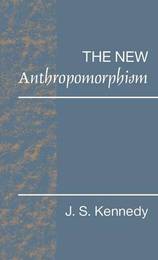
|
The New Anthropomorphism
Hardback
Main Details
| Title |
The New Anthropomorphism
|
| Authors and Contributors |
By (author) John S. Kennedy
|
| Physical Properties |
| Format:Hardback | | Pages:208 | | Dimensions(mm): Height 216,Width 140 |
|
| Category/Genre | Animal behaviour |
|---|
| ISBN/Barcode |
9780521410649
|
| Classifications | Dewey:591.51 |
|---|
| Audience | | Professional & Vocational | |
|---|
| Illustrations |
7 Line drawings, unspecified
|
|
Publishing Details |
| Publisher |
Cambridge University Press
|
| Imprint |
Cambridge University Press
|
| Publication Date |
16 July 1992 |
| Publication Country |
United Kingdom
|
Description
Is anthropomorphism dead? Modern students of animal behaviour mostly think it is and are therefore confident that their own use of anthropomorphic language is purely metaphorical. John Kennedy's point is that explicit anthropomorphism was indeed well-nigh killed by fierce criticism from the radical Behaviourists, but that we have to recognize that today there is a new anthropomorphism which is much harder to avoid because it is unintended and largely unconscious. It exists because of a fact only hinted at in the literature: that an anthropomorphic 'fellow-feeling' towards animals, especially higher ones, is built into us by nature and nurture. For that reason even those who if they were asked would firmly reject anthropomorphism nevertheless unwittingly slip into it from time to time. The book provides ample documentary evidence of this. It contains nineteen essays on behavioural concepts which have seldom been identified as anthropomorphic but in fact bear that connotation and lead to mistakes. Some of these, such as search images in birds and the learning of grammatical language by apes, have been seen through as errors after a time. A greater number, such as efference copy, goal-directedness, cognition and suffering in animals, are still current though not yet regarded as erroneous. We can hardly hope to cure ourselves altogether of thinking anthropomorphically, and it is anyway very useful as a metaphor. The final chapter outlines things we can do to minimise the damage it does to the causal analysis of animal behaviour.
Reviews'Anyone interested in animal welfare should read this book.' P. J. B. Slater, Animal Welfare 'This is an important book that will encourage a more scientific study of animal behaviour.' Robert Barrass, Journal of Biological Education
|